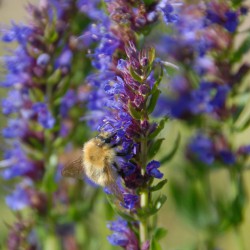Special Offers
Redeem Offer Code
Redeem Gift Voucher
Scarecrow Members
Our Feedback
Again for the 4th or 5th year running you've never failed to give me exactly what I ordered. Everything I've ever ordered has been superb quality delivered safely & efficiently and on-time. Thank you Stephen & Serena.
D. P, Culcheth, Warrington
Hyssop Seed




Hyssopus officinalis
A lovely herb with beautiful blue flowers that will attract plenty of bees!
- Can be used as a dried flower.
- Good accompaniment for meat dishes.
Supplied as a packet of approximately 200 seeds.
This Product is Available Now.1 or more £2.25GBP each. Group & quantity discounts
Description
The intense blue flowers are an ideal garnish for salads. An aromatic shrubby plant which bees love because it produces so much pollen!
A member of the mint family.
Recommended by the RHS to be an excellent attractant and nectar source for bees and other beneficial insects.
- Hardy perennial.
- Semi-evergreen.
- Slim, dark green foliage.
- Prefers light, free-draining, alkaline soil. Will grow in most soils.
- Prefers full sun or part shade.
- Sow seeds under glass in early spring.
- Plant seedlings out during the summer 2 feet (60 cm) apart.
- Can reach 2 feet (60 cm) tall and wide.
- Blue flowers August to October.
- Benefits from being cut back hard in spring or summer as otherwise can become woody.
- Flowers June to October.
- Planting Instructions For Hedging.
- Plant 8" (20 cm) apart.
- 8 - 12" (20 - 30 cm) growth per year.
- Culinary Uses.
- Good accompaniment with meat, beans soup and salad.
- Used for flavouring liquers.
- Use leaves sparingly in salads.
- Flowers are edible.
- Medicinal Uses.
- Anti-inflammatory and therefore can relieve rheumatic pains.
- Used in the bath it will help lighten a negative mental state and anxiety.
- Can help sore throats if gargled.
- Can help weak stomachs, help digestion (especially with fatty meats and fish) and colic.
- Can loosen catarrh, soothe lungs and chest so helps coughs and colds.
- Can calm your nervous system if drunk as a tonic.
- Other Uses.
- Can be used as an insect repellant.
- Will attract cabbage white butterflies and bees.
- Makes a lovely hedge.
- Can be used in pot pourri.
- Planted near vines can increase yield.
Disclaimer
As with all alternative medicines and plants with purported medicinal benefits it is important to inform your health care providers that you are using them; this helps to ensure safe and coordinated care. We can accept no liability for any side effect or contingency from any allergy or any other cause or harm that may arise. If in doubt please do consult a medical practitioner before using. Not recommended for use for longer than two weeks or if you are pregnant, breast feeding or have heart condition or thyroid problem.
Pricing
This Product is Available Now.This product is subject to group discount if you are buying multiple products from the same pricing group. Other products in this group are...
Angelica Seed
Anise Seed
Basil Seed - Holy Basil
Basil Seed Sweet Genovese
Bergamot Seed - Wild Bergamot
Borage Seed
Caraway Seed
Catgrass Seed
Catnip Seed
Chives Seed
Coriander Seed 'Leisure'
Cumin Seed
Dill Seed
Epazote Seed
Fennel Seed
Garlic Chives Seed
Golden Purslane Seed
Lemon Balm Seed
Lemon Grass Seed 'East Indian'
Lovage Seed
Marjoram Seed
Oregano Seed
Parsley Seed 'Champion Moss Curled'
Parsley Seed 'Hamburg'
Parsley Seed 'Italian Giant'
Purslane Seed
Rosemary Seed
Russian Comfrey Seed
Russian Tarragon Seed
Sage Seed
Summer Savory Seed
Tansy Seed
Thyme Seed
White Borage Seed
Winter Savory Seed
Wormwood Seed
How To...
How To Sow & Grow Herbs
Detailed advice on sowing and growing herbs outside and under protection. Includes information on watering and pest control.
General Information
A Note About Our Seed Packets & Seed Counts
Information on Victoriana's method of packeting seed, including information on the seed packets. Also details on Victoriana's seed guarantee.
Pollinator Friendly Plants
A detailed guide to the seeds and plants sold by Victoriana Nursery Gardens that will attract and provide a food source to bees and other beneficial pollinating insects.

 01233 740529
01233 740529





